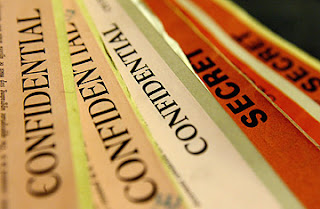So another big infodump is going on at Wikileaks and several associated newscorps, this time involving reams and reams of diplomatic cables. Unlike previous infodumps, this one is set to be released in a staggered fashion throughout the week, with each day getting its own focus.
Cables related to Canada is scheduled for Thursday. Personally, I can hardly wait, though I fear there may not be anything particularly juicy - all I've heard so far is rumours about U.S. diplomats talking about Canada's "inferiority complex." We don't have an inferiority complex, not really (our cultural problems relating to the U.S. are worse than that), but I can see how some who might not quite understand Canadian culture might mistake our identity issues for such... So that's not really such a big deal for me. As I said, hopefully there's something more interesting related to Soviet Canuckistan, but we'll see.
Already we've hearing the bleating objections of the powers-that-be, who are once again terribly butthurt over the whole ordeal of their secrets being revealed for all and sundry. These leaks, they claim, stand to get a lot of people hurt or killed (where have we heard that objection before? It's crying wolf at this point, really) and to impede the U.S. government's ability to engage with other nation-states in a diplomatic fashion, since frank diplomatic statements cannot be made without fear of public exposure. Negotiations between nations, so the argument goes, need to be kept secret until they've reached their completion, at which point the public can hear a press release about it. Breaking down the logic, the argument goes like this:
-Diplomacy needs secrecy to work.
-Diplomacy prevents wars.
-Transparency and secrecy are mutually exclusive.
-Therefore, transparency will prevent diplomacy from being an effective tool.
-A nation will be disinclined to use an ineffective tool.
-Thus, diplomacy will be shunned in favour of other methods.
-Ergo, transparency will cause more wars.
It's a fairly decent logical construction, but like all logical constructions it's only true if you buy into the premises. Here's where Sweden comes into the picture.
See, there's a law in Sweden that makes the vast majority of government records and documents public. And when I say vast majority, I mean it - to the point that every government e-mail is free for any citizen to read. At one point, a secret Scientology document was basically made available to the public because it was sent to a high-ranking government official, which thereby made it available to Swedes at large. Another time it got evil biotech corp Monsanto's panties in a bunch because this policy of transparency allowed Greenpeace to get its hands on a document relating to one of their evil biotech corp products.
Sweden is ranked by Transparency International as the most transparent government on the planet thanks to these and other policies (it's followed by New Zealand and Denmark.) According to the argument laid out above, these countries would be unable to engage in any sort of diplomatic relations. This is clearly an absurd claim.
That means the first premise in that logical construction I detailed above is untrue, and as a result the entire argument falls apart.
But all that's really besides the point, because here's the bottom line: Voters, citizens, have responsibilities. These responsibilities include overseeing the people we put into place to represent us as our government. This requires us to inform ourselves as best we can not only the things our governments do on our behalf, but also the relationships they form with other governments. It is ludicrous to expect a governmental body to police itself. Therefore, we need as much transparency as we can scrape together in order to hold them to task for the things they do. There should be little to no privilege of secrecy here, because time and time again it has been proven that governments use any secrecy they can achieve for unethical behaviour. Even if heightened transparency makes some tasks more difficult it's a small price to pay.
More nations should follow Sweden's example. More citizens should demand their governments do so.
UPDATE: There's a really great article at the Guardian over the whole ethical argument of leaking that I recommend reading. It lays out the same basic argument that I've been making for months in a very succinct manner:
Anything said or done in the name of a democracy is, prima facie, of public interest. When that democracy purports to be "world policeman" – an assumption that runs ghostlike through these cables – that interest is global.

No comments:
Post a Comment